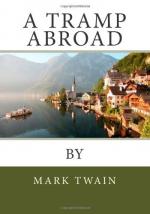Also! Die Anblich so viele Grossbrittanischer
und Amerikanischer hier zusammengetroffen in Bruderliche
concord, ist zwar a welcome and inspiriting spectacle.
And what has moved you to it? Can the terse
German tongue rise to the expression of this impulse?
Is it Freundschaftsbezeigungenstadtverordneten-versammlungen
familieneigenthuemlichkeiten?
Nein, o nein! This is a crisp and noble word,
but it fails to pierce the marrow of the impulse which
has gathered this friendly meeting and produced diese
Anblick—eine Anblich welche ist gut zu
sehen—gut fuer die Augen in a foreign land
and a far country—eine Anblick solche als
in die gewoehnliche Heidelberger phrase nennt man ein
“schoenes Aussicht!” Ja, freilich natuerlich
wahrscheinlich ebensowohl! Also! Die Aussicht
auf dem Koenigsstuhl mehr groesser ist, aber geistlische
sprechend nicht so schoen, lob’ Gott! Because
sie sind hier zusammengetroffen, in Bruderlichem concord,
ein grossen Tag zu feirn, whose high benefits were
not for one land and one locality, but have conferred
a measure of good upon all lands that know liberty
today, and love it. Hundert Jahre vorueber,
waren die Englaender und die Amerikaner Feinde; aber
heut sind sie herzlichen Freunde, Gott sei Dank!
May this good-fellowship endure; may these banners
here blended in amity so remain; may they never any
more wave over opposing hosts, or be stained with
blood which was kindred, is kindred, and always will
be kindred, until a line drawn upon a map shall be
able to say: “This bars the ancestral
blood from flowing in the veins of the descendant!”
APPENDIX E Legend of the Castles
Called the “Swallow’s Nest” and “The Brothers,” as Condensed from the Captain’s Tale
In the neighborhood of three hundred years ago the Swallow’s Nest and the larger castle between it and Neckarsteinach were owned and occupied by two old knights who were twin brothers, and bachelors. They had no relatives. They were very rich. They had fought through the wars and retired to private life—covered with honorable scars. They were honest, honorable men in their dealings, but the people had given them a couple of nicknames which were very suggestive—Herr Givenaught and Herr Heartless. The old knights were so proud of these names that if a burgher called them by their right ones they would correct them.
The most renowned scholar in Europe, at the time, was the Herr Doctor Franz Reikmann, who lived in Heidelberg. All Germany was proud of the venerable scholar, who lived in the simplest way, for great scholars are always poor. He was poor, as to money, but very rich in his sweet young daughter Hildegarde and his library. He had been all his life collecting his library, book and book, and he lived it as a miser loves his hoarded gold. He said the two strings of his heart were rooted, the one in his daughter, the other in his books; and that if either were severed




